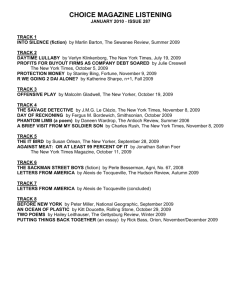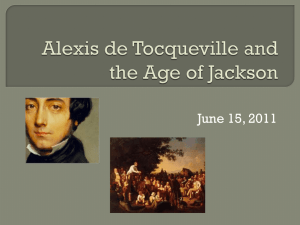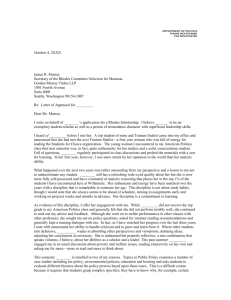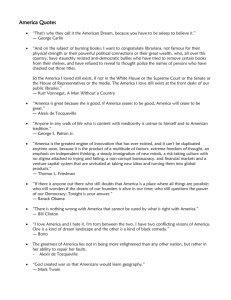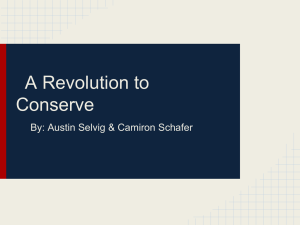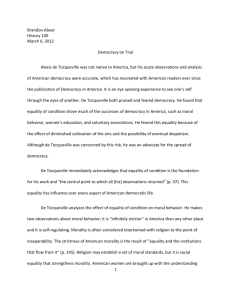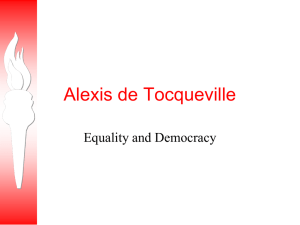PS65 Tocqueville syllabus
advertisement
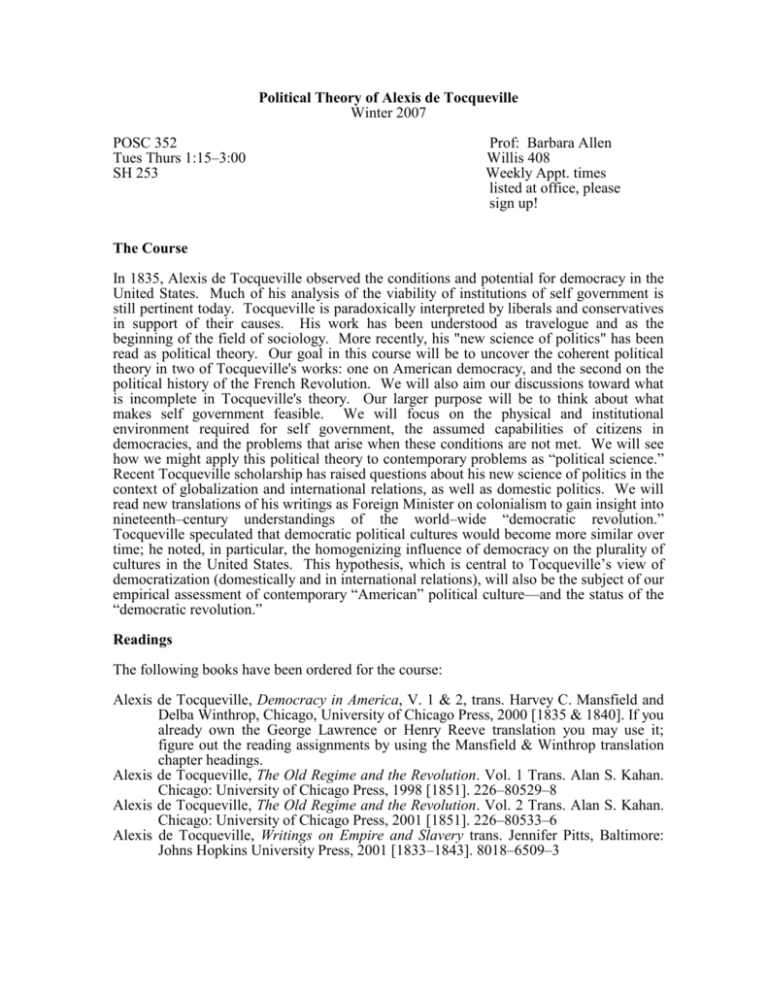
Political Theory of Alexis de Tocqueville Winter 2007 POSC 352 Tues Thurs 1:15–3:00 SH 253 Prof: Barbara Allen Willis 408 Weekly Appt. times listed at office, please sign up! The Course In 1835, Alexis de Tocqueville observed the conditions and potential for democracy in the United States. Much of his analysis of the viability of institutions of self government is still pertinent today. Tocqueville is paradoxically interpreted by liberals and conservatives in support of their causes. His work has been understood as travelogue and as the beginning of the field of sociology. More recently, his "new science of politics" has been read as political theory. Our goal in this course will be to uncover the coherent political theory in two of Tocqueville's works: one on American democracy, and the second on the political history of the French Revolution. We will also aim our discussions toward what is incomplete in Tocqueville's theory. Our larger purpose will be to think about what makes self government feasible. We will focus on the physical and institutional environment required for self government, the assumed capabilities of citizens in democracies, and the problems that arise when these conditions are not met. We will see how we might apply this political theory to contemporary problems as “political science.” Recent Tocqueville scholarship has raised questions about his new science of politics in the context of globalization and international relations, as well as domestic politics. We will read new translations of his writings as Foreign Minister on colonialism to gain insight into nineteenth–century understandings of the world–wide “democratic revolution.” Tocqueville speculated that democratic political cultures would become more similar over time; he noted, in particular, the homogenizing influence of democracy on the plurality of cultures in the United States. This hypothesis, which is central to Tocqueville’s view of democratization (domestically and in international relations), will also be the subject of our empirical assessment of contemporary “American” political culture—and the status of the “democratic revolution.” Readings The following books have been ordered for the course: Alexis de Tocqueville, Democracy in America, V. 1 & 2, trans. Harvey C. Mansfield and Delba Winthrop, Chicago, University of Chicago Press, 2000 [1835 & 1840]. If you already own the George Lawrence or Henry Reeve translation you may use it; figure out the reading assignments by using the Mansfield & Winthrop translation chapter headings. Alexis de Tocqueville, The Old Regime and the Revolution. Vol. 1 Trans. Alan S. Kahan. Chicago: University of Chicago Press, 1998 [1851]. 226–80529–8 Alexis de Tocqueville, The Old Regime and the Revolution. Vol. 2 Trans. Alan S. Kahan. Chicago: University of Chicago Press, 2001 [1851]. 226–80533–6 Alexis de Tocqueville, Writings on Empire and Slavery trans. Jennifer Pitts, Baltimore: Johns Hopkins University Press, 2001 [1833–1843]. 8018–6509–3 Course Requirements Below are listed the readings and general topics for each of our meetings. Our seminar will be conducted in a lecture/discussion format during the first part of the course, covering Tocqueville’s democratic theory taken from Democracy in America. At the end of this part you will complete one take–home exam. In the second part of the course we consider Tocqueville’s analysis of historical sources and first-hand obersvations of democratization in greater detail. We look first at his archival research on the French Revolution to think about the uses of historical data as a basis for democratic theory. Next we focus on Tocqueville’s writings as the Foreign Minister in a regime that solidified French imperial dominance in North Africa. In this section of Part 2 we take up questions about race, equality, self-determination, and self-government in the nineteenth-century context of the democratic revolution. We conclude the course with presentations of our “Tocquevillean” assessment of democratic political culture in America today and contemporary issues in democratization, the subject of your 20+ page seminar paper. Grades will be computed as follows: Exam Seminar Paper and presentation Total 50% 50% 100% Topics for Discussion and Reading Assignments Part 1 Tocqueville's Theory: Thurs Jan 4 Topics: Reading Tocqueville—the importance of language, historical context of Tocqueville's writing Read: Democracy (D) V2, pt 1 ch 1; author's preface (“Notice”) to V2; V 1 author's intro Tues Jan 9 Topics: Tocqueville's model, terms &definitions; the social condition, physical environment and mores of a people; the meanings of popular sovereignty Read: D V2 pt. 1 Ch 2–8; V1 pt. 1 Ch 1–4 Thurs Jan 11 Topics: The conception and function of American Government—Tocqueville instructs the French on problems in the structure of relationships; balancing liberty and equality; multiple centers of decision making authority Read: D V1 pt. 1 Ch 5–8, pt. 2 Ch 1 Tues Jan 16 Topics: Tyranny of majority and minority; public opinion and common belief; extrapolation of Tocqueville's analysis to a general theory of problems of tyranny in organizations and associations Read: D V1 pt. 2 Ch 2–7 Thurs Jan 18 Topics: Majority tyranny and concentration of political power; public opinion and bureaucracy Read: D V2 Pt 2 Ch 18–20; Pt 4 Ch 1–8 Tues Jan 23 Topics: Institutional solutions to majority tyranny, applications for other organizations; residual problems of majority and minority tyranny Read: D V1 pt 1 Ch 8, pt 2 Ch 1, & 4 (review); V1 pt 2 Ch 8, 9 Thurs Jan 25 Topics: The normative foundation of self–government; epistemic choice and responses to tyranny—religion, voluntary associations, self interest rightly understood Read: D V2 Pt 1 Ch 5–8 (review); Pt 2 (all) V1 pt. 2 Ch 4, 9 ***************Research Plans Due in Class********** Tues Jan 30 Topics: Participation, learning, and the maintenance of community; relationship between laws, customs, and mores; requirements for citizens and the design of their institutions Read: V2 pt 3 (all) Thurs Feb 1 Topics: Community and individual: assimilation and separate cultures in American: race and ethnicity Read: D V1 pt 2 Ch 10; V2 Pt 1 Ch 1–8; Pt 2 Ch 1–8 (review) Writings on Empire and Slavery (ES) “Emancipation of Slaves” *************** Take Home Exam Question Available in Class *********** Tues Feb 6 Topics: Community and individual: socialization and mores: gender and family Read: D V2 Pt 3 Ch 5, 8–13 (review) Reading Assignments and Topics for Part 2a Historical Examples of the Democratic Revolution: Empirical Observation and Theoretical Analysis Thurs Feb 8 Topics: An in-depth analysis of democratization and centralized authority Read: Old Regime and the Revolution (OR)V1 Bk 1, Ch 1–5; Bk 2 Ch 5 Tues Feb 13 Topic: Reform and revolution: Institutional trajectories Read: OR V 2 Bk 1 Ch 1–7 Thurs Feb 15 Topic: Reform and revolution: Applications to contemporary problems in constitutional choice Read: OR V1 Bk 2 Ch 6–12 and V 2 “Notes Relating…to Book 2 of First Volume” pp. 292–359 ******************* Take Home Exam Due in Class ********************* Tues Feb 20 Topic: Threats to maintaining a democratic system; revolutionary words vs. revolutionary change Read: OR V1 Bk 3 Ch 1–8; OR V 2 “Notes Relating…to Book 3 of First Volume” pp. 359–373; D V2 Pt 4 Ch 1–8 Reading Assignments and Topics for Part 2b Historical Examples of the Democratic Revolution: Equality, Race, and Empire Thurs Feb 22 Topic: Democracy and the political economy of slavery, colonization, and empire Read: OR V 2 BK 3 (all) Writings on Empire and Slavery (ES) “Some Ideas about what Prevents the French from having Good Colonies,” “First Letter on Algeria,” “Second Letter on Algeria,” pp. 1–26 *******************Research Paper Draft Due in Class ********************* Tues Feb 27 Topic: Equality and Race Read: ES “Notes on the Voyage to Algeria in 1841” and “Essay on Algeria,” pp. 36–116 Thurs Mar 1 Topic: Equality and Constitutional Structure Read: First Report on Algeria,” Second Report on Algeria,” pp. 129–198. Tues Mar 6 Final paper presentations Thurs Mar 8 Class Summary: The Democratic Revolution: Liberty, Equality—and Empire? Or, A New World Community through Universal Associations *** Final Versions of Research Paper Due March 8, My Office 5:00 p.m. ***
